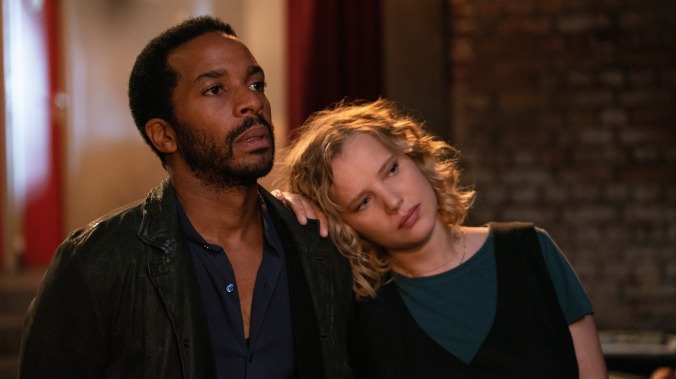A striking composition full of familiar notes, Netflix’s The Eddy brings together an international cast, a BAFTA-winning screenwriter, a Grammy-winning producer, and an auteur whose films reveal a preoccupation with single-minded pursuits. The eight-part limited series is set in Paris’ 13th arrondissement, where Elliot Udo (André Holland), a renowned yet retired American musician, is trying to kickstart a new career as a band manager and nightclub owner. He struggles on both fronts, in part because most of his patrons and friends, including his business partner, Farid (A Prophet’s Tahar Rahim), are holding out hope that the jazz pianist and composer will one day take the stage again. The prevailing image of Elliot is that of a virtuoso, no matter that tragedy has shaped his life as much as success has.
It’s one of several ways in which The Eddy explores how our memories can both hinder and heal us. Sometimes, the things we can’t let go of threaten to drown us; other times, they’re a lifeline. Series creator and writer Jack Thorne, who recently adapted Philip Pullman’s His Dark Materials for HBO, charts a less perilous journey here, but there’s still plenty of danger and thrills. Elliot isn’t aware of just how precarious his position is until halfway into the season, because he’s been so focused on landing a record deal for his band and making his club, The Eddy, a city hotspot. But we can see the walls closing in, the number of threats rising, as The Eddy combines a compelling, if unoriginal, murder mystery with a moving character study.
The tension builds steadily, as does the chorus of voices that make up Thorne’s tale of ambition and reconciliation. The second episode introduces Elliot’s daughter, Julie (Amandla Stenberg), a prickly and perceptive teen, who’s inherited her father’s musical ability but not his aversion to emotional frankness. Julie storms back into Elliot’s life, only to find him closed off to everything but the band and the club. So she takes refuge in his found family, bonding with Maja (Cold War’s chanteuse Joanna Kulig), the singer in the Eddy’s house band, and Amira (Leïla Bekhti), one of Elliot’s closest friends—which, under the present circumstances, isn’t saying much. We also meet Sim (relative newcomer Adil Dehbi), one of the club’s employees, who has musical aspirations of his own.
The Eddy keeps the spotlight moving between characters, giving them the attention they’re often lacking from Elliot. With each new hour, the series gets us to invest in a new viewpoint, thanks to a writing staff as varied as the multilingual cast: Rachel De-Lahay, Rebecca Lenkiewicz, Hamid Hlioua, and Phillip Howze all share scripting duties with Thorne. Everyone from Holland to Stenberg to Kulig owns their dedicated episode, but the Bekhti-led installment, “Amira,” is the best of the bunch, churning with as much suspense as guilt. Thorne and director Houda Benyamina celebrate Paris’ distinct populations, but not without acknowledging racial tensions and Islamophobic sentiment. The discussion doesn’t stop there—while exploring the intricacies of interracial relationships, The Eddy also contends with the effects on the biracial children raised within them.
At the center of this swirl of storylines and cultures is a steadfastly great Holland, who showed real vulnerability and astuteness in Moonlight and High Flying Bird. He plays Elliot as charismatic yet flinty, direct and withholding—someone whose life is so compartmentalized that he initially fails to see that the people around him are floundering. Holland shares a layered chemistry with Kulig as musical collaborators turned lovers turned something else. And because it is Paris, after all, Julie begins a complicated romance with Sim, feelings that Stenberg and Dehbi nurture. But the father-daughter relationship is the heart of The Eddy, as the battle of wills we see early on gives way to hard-earned understanding. Holland and Stenberg are in sync with each other every step of the way, their performances first creating space for alienation and hurt, which they bridge with empathy and accountability.
Oscar winner Damien Chazelle helms the first two episodes, setting up the vérité style used throughout the series with his usual elan. Beyond his old stomping grounds, it’s not hard to see what drew Chazelle to the show, which began its life as songs by Glen Ballard, co-writer and producer on Alanis Morissette’s Jagged Little Pill. Elliot’s unwavering course could just as easily be mapped onto the director’s feature films like Whiplash, and particularly First Man. Just as in that 2018 biographical drama, tunnel vision is a byproduct of ambition and a coping mechanism. Chazelle’s collaborators, Laïla Marrakchi, Alan Poul (who, after meeting with Ballard in 2013, brought in the La La Land director), and the aforementioned Benyamina, maintain the spirited, occasionally dizzying pace—though, as befits a show fueled by jazz, they do their own improvising.
The result is a lushly cinematic show, but the impressive direction—cinematographers Eric Gautier and Julien Poupard find breathtaking new angles and sights in the city of lights—can’t keep the show from sagging in the middle, as well as toward the end of each 50-plus-minute runtime (the premiere is nearly 70 minutes, though, so Thorne et al. do eventually get around to tightening things up). The musical interludes also run long, and close to interminable for anyone who isn’t a fan of jazz.
But while The Eddy takes place in a Paris neighborhood you don’t see on postcards, its structure and themes will feel immediately familiar. A sudden death makes everyone reevaluate their lives; an ambitious man recommits to family; a self-destructive teen finds healthier ways to work through her pain. Even a late-hour twist is more gentle curve in the road than a divergence. Recognizing the beat doesn’t make The Eddy less moving, but it does keep an impeccably made series from being something more groundbreaking.








































